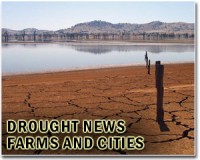| . |  |
. |
Sydney (AFP) April 4, 2010 For Australian farmers who have struggled to make a living in southern Queensland as their crops died and their dams ran empty during years of drought, recent floods have ended the "Big Dry". "We've had the worst drought in a generation and now we're back to some of the best conditions in a generation," said cattleman John Cotter. "It doesn't rain money but it rains potential to make money. And psychologically, it's got enormous positives," Cotter, who heads the farmers lobby group AgForce, said of the deluge which has flooded parts of Queensland. "There's a real spring in people's step as to how they feel about it." Neighbouring New South Wales has also benefited from the downpour which began earlier this year, with just 40 percent of the state now in drought, compared to 81 percent in January. Across the country, the federal government estimates that the amount of agricultural land in drought has fallen from 32 percent to 29 percent. But while the deluge has brought hope to some farmers, giving them guaranteed water and quality pasture for the next 12 to 18 months, the water is unlikely to make it down to southern areas still in the grip of drought. "We certainly can't all relax and say, 'There's been all this rain, it's over'," Ian Prosser, acting director of water research at the government's science research body CSIRO, told AFP. "It's certainly not over. The southern Murray Darling Basin and Victoria are still very much in drought," he said, adding that the southern cities of Melbourne and Canberra, along with Perth in the west, also had limited water. "And there's every probability that that situation will continue into next summer because even if there was average rainfall this winter, there would still be below average irrigation allocations next year." Beginning in late February, heavy rains fell over much of central and northeastern Australia. By early March parts of Queensland were flooded, with some areas receiving their average annual rainfall in one day. The floods mean that hundreds of gigalitres of water held in Queensland catchments will be sent downstream into the parched southern states. But Prosser said the floods would be of little help to the country's key farming zone, the Murray Darling Basin. This region -- which generates 39 percent of the national income derived from agricultural production -- remains among the country's worst drought-affected areas. And because it has been in drought for so long, it will take sustained heavy rains to bring it back to condition. Prosser said the unprecedented drought produced the risk of some irreversible changes, including the acidification of lakes and habitat losses further downstream in areas of South Australia. "We're probably at the cusp of some pretty big ones (changes)," he said. "If things start to get wet again from here on in we'll start to rescue a lot. But if we get another five years of this (drought) there's just going to be an increasing number of things falling over." Prosser also warned that the deluge in some areas could not mask longer-term concerns. "Queensland is out of a drought, but it doesn't mean it is out of climate change," he said.
Share This Article With Planet Earth
Related Links Climate Science News - Modeling, Mitigation Adaptation
 China drought leaves 24 million short of drinking water
China drought leaves 24 million short of drinking waterBeijing (AFP) March 31, 2010 China said Wednesday that more than 24 million people were short of drinking water because of a crippling drought, the worst to hit the country in a century. Most of those affected live in the southwest where meteorologists say the situation will not improve until the rainy season, which should kick off after May 20, vice minister of water resources Liu Ning told reporters. Authorities h ... read more |
|
| The content herein, unless otherwise known to be public domain, are Copyright 1995-2010 - SpaceDaily. AFP and UPI Wire Stories are copyright Agence France-Presse and United Press International. ESA Portal Reports are copyright European Space Agency. All NASA sourced material is public domain. Additional copyrights may apply in whole or part to other bona fide parties. Advertising does not imply endorsement,agreement or approval of any opinions, statements or information provided by SpaceDaily on any Web page published or hosted by SpaceDaily. Privacy Statement |